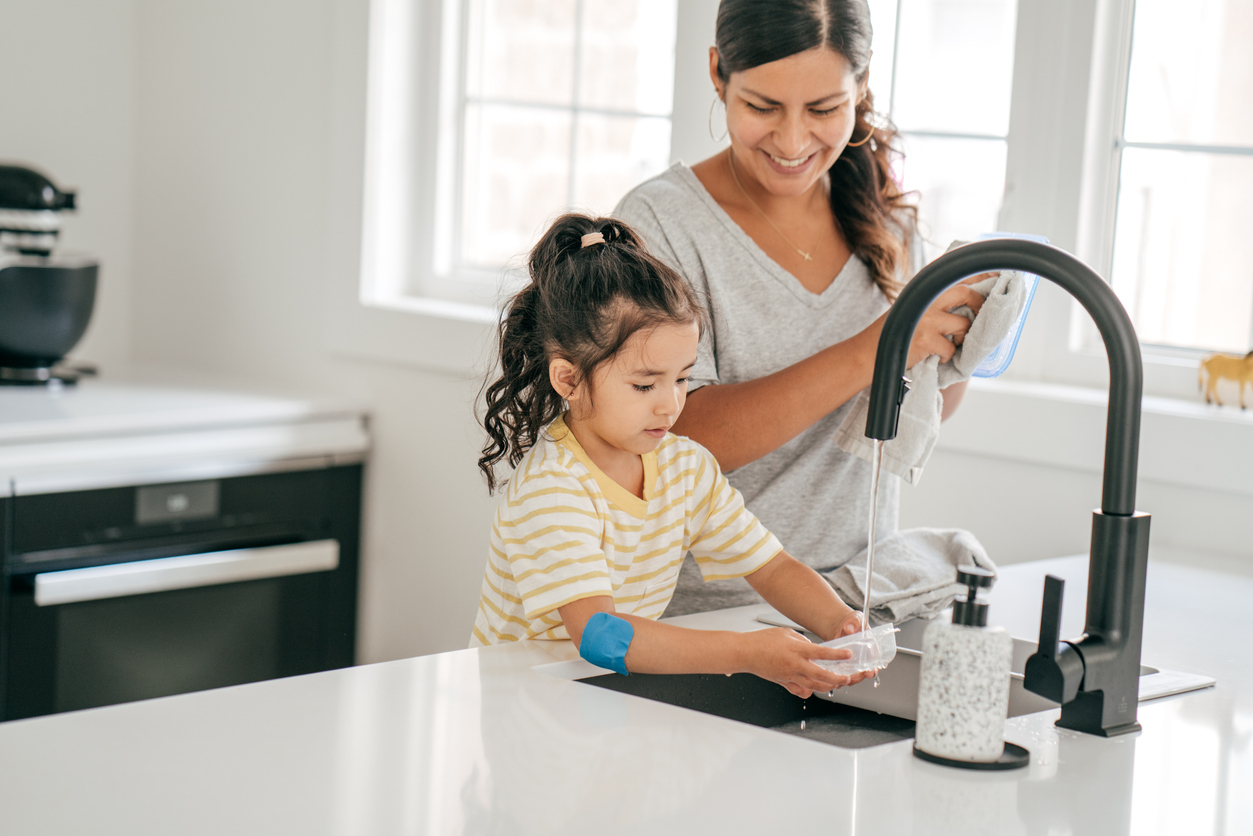
Raising Responsible Kids:
Age-Appropriate Tasks for Building Independence and Character
Developing responsibility in children
is crucial for their growth and success. It teaches essential life skills,
builds character, and prepares them for future challenges. Encouraging
responsibility fosters independence, self-discipline, and a sense of
accomplishment, instilling values like accountability, reliability, and
empathy. In India, parents often allow children to play in make-believe
kitchens and pretend to cook but hesitate to let them engage in real kitchen
tasks. Bridging this gap can enhance a child’s sense of responsibility and
practical skills.
As children grow, they become more
responsible and willing to help others. It is crucial to consider the child’s
age and understand their developmental stage, which helps us recognize their
characteristics and natural preferences. Responsibilities should not overwhelm
the child; if they do, change the activity to something the child enjoys and
appreciates. Children should have all the necessary tools to carry out the
activity effectively.
Responsibilities for 3-Year-Olds
·
Pick up toys and put
them away in the correct place.
·
Put books, magazines,
and newspapers in their designated places.
·
Sweep the floor with a child-sized
broom.
·
Set the table.
·
Clean under the table
after meals with a dustpan and brush.
·
Choose between two
different options for breakfast and lunch.
·
After meals, carry their
plate to the washing area, empty leftovers into the trash, and wash the plate.
·
Learn to use the toilet.
·
Brush teeth, wash and
dry hands, and brush hair. Provide a stool so they can reach the sink.
·
Undress and dress
themselves with help.
·
Mop up spills or
accidents.
·
Put away boxes or cans
from the grocery store on lower shelves.
·
Separate waste into
different trash bins.
·
Sort vegetables brought
from the shop and place them in their respective baskets or locations.
Responsibilities for 4- to 5-Year-Olds Introduce a goal chart.
Choose tasks together and reward completion with a special treat.
1.
Help with grocery
shopping and suggest foods to purchase.
2.
Polish shoes.
3.
Feed and water pets.
4.
Assist with watering,
weeding, and planting.
5.
Help make their bed.
6.
Help vacuum.
7.
Wipe washed dishes.
8.
Dust furniture.
9.
Assist in cooking by
peeling, pouring, seeding, adding ingredients, mashing potatoes, mixing,
preparing plates for family dinner, pouring water into glasses, and cleaning
the dining table after meals.
10.
Polish silver and help
polish the car.
11.
Sharpen pencils.
12.
Dress themselves and
choose their outfit for the day.
13.
Learn to tie shoelaces.
14.
Scrub and wash the sink
and toilets.
15.
Clean mirrors and
windows.
16.
Fold clothes and put
them away.
17.
Learn to answer the
telephone and dial emergency numbers.
18.
Help clean the car
interior.
19.
Take out the garbage.
20.
Begin learning social
skills, such as sharing toys with playmates and asking before going out to
play. The child should be able to play for short periods without adult
supervision.
21.
Suggest family
activities to be funded by the entertainment budget.
22.
Begin handling money by
paying for small purchases in cash and receiving change.
Responsibilities for 6- to 7-Year-Olds
1.
Water houseplants.
2.
Sweep and hose off the
patio or deck.
3.
Begin using sharp knives
to peel vegetables and use the stove and microwave to prepare simple food.
4.
Carry in grocery bags.
5.
Prepare their own school
lunch.
6.
Walk the dog if it is
not too big.
7.
Bathe the dog.
8.
Bandage minor injuries.
9.
Wash out trash cans.
10.
Wash walls and mop
floors.
11.
Clean drawers.
12.
Hang their own clothes
in the closet.
13.
Do simple ironing.
14.
Leave the bathroom tidy
by hanging up towels and putting dirty clothes in the hamper.
15.
Care for their bicycle,
including cleaning and locking it when not in use.
16.
Care for outdoor play
equipment.
17.
Use an alarm clock to
wake up in the morning and go to bed on their own at night.
18.
Carry books and lunch to
school.
19.
Run errands in the
neighborhood when parents ask.
20.
Take telephone messages
and write them down.
Responsibilities for 8- to 9-Year-Olds
1.
Mop the floor.
2.
Wax furniture.
3.
Clean miniblinds.
4.
Clean their own closet
and drawers.
5.
Run their own bath
water.
6.
Fold their blankets.
7.
Perform minor clothing
repairs, such as replacing buttons or sewing rips.
8.
Select their own
clothing and shoes with parental guidance.
9.
Change into play clothes
after school without being asked.
10.
Begin reading recipes
and occasionally cooking for the family.
11.
Cut flowers and arrange
them in a vase.
12.
Prepare lemon and orange
juices.
13.
Occasionally feed the
baby.
14.
Briefly watch younger
siblings while parents are available, such as playing a game with them while
the mother cooks.
15.
Know how to cross the
street safely.
Responsibilities for 10- to
11-Year-Olds
·
Change bed sheets and
put the soiled ones in the wash.
·
Operate the washing
machine, including measuring detergent, fabric softener, and bleach.
·
Buy groceries using a
list and choose economical brands.
·
Keep track of their own
schedule, including regularly scheduled practices and dental appointments.
·
Receive and answer mail
addressed to them.
·
Prepare and pour tea,
coffee, and cold drinks.
·
Serve guests.
·
Plan their own parties.
·
Know simple first aid.
·
Learn to use a sewing
machine.
·
Learn about bank
accounts and begin a savings account.
·
Wash the car.
Responsibilities for 11- to
12-Year-Olds
·
Begin earning their own
money by babysitting or washing cars.
·
Learn safety rules for
staying home alone.
·
Learn to take public
transportation.
·
Pack their own suitcase
for overnight trips.
·
Take responsibility for
their own hobbies.
·
Learn to handle
themselves safely and politely in public places alone or with peers.
·
Join organizations and
take on some leadership responsibilities.
·
Dress and undress
younger siblings and put them to bed.
·
Clean the pool and pool
deck.
·
Run their own errands
when reasonable.
·
Work with parents on
home repair or construction projects.
·
Clean the oven or refrigerator.
·
Set their own schedule
to manage homework and instrument practice.
·
Purchase their own
treats.
Responsibilities for Adolescents
·
Determine their own
bedtime.
·
Discuss and decide on a
curfew for evening gatherings with parents.
·
Take complete responsibility
for preparing a family meal.
·
Learn to maintain good
health through exercise, adequate rest, weight control, eating nutritious food,
and annual check-ups.
·
Anticipate the needs of
family members and friends and offer to help.
·
Understand and accept
their capabilities and limitations.
·
Respect themselves and
take responsibility for their decisions.
·
Demonstrate loyalty,
honesty, and respect to others.
Ultimately, being patient with the
child is crucial. Whenever a task is completed, appreciate the child’s
involvement in the family. By doing so, we not only build their confidence but
also strengthen the foundation for a responsible and capable adult. Encouraging
practical engagement, especially in real-life activities, will help children
develop the skills they need to thrive and contribute meaningfully to their
communities.



